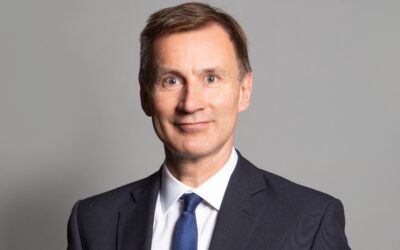Hull City Council and East Riding of Yorkshire Council are to undergo devolution in a deal announced as part of Chancellor Jeremy Hunt’s autumn statement.
The deal, which is subject to councillors’ approval and a statutory public consultation in January, could bring significant investment into the area, create more job opportunities and establish a Hull and East Yorkshire Mayoral Combined Authority, led by a directly elected mayor, who would be elected in May 2025.
Key aspects of the proposed deal include £400 million (£13.34 million a year) investment funding over 30 years to drive growth and deliver local priorities and new powers, and budget, on regeneration, building new homes and integrating the region’s transport network.
Cllr Anne Handley, leader of East Riding of Yorkshire Council, said: “After months of hard work, I am absolutely thrilled that we can finally say we have a proposed deal and our residents can see what East Yorkshire devolution would really mean to them.
“I have said all along that a Mayoral Combined Authority is absolutely the right way forward for our region, but that it must be the right deal.
“I am confident we now have the right deal to begin our devolution journey and I urge everyone to get involved in the consultation and get behind this deal. ”
Michael Gove MP, Secretary of State for Levelling Up, Housing and Communities, added:”By taking decisions out of Whitehall and putting them back in the hands of local communities, this deal will enable Hull and East Yorkshire to unleash its full economic potential and build upon its strengths in manufacturing and health technologies.”
Elsewhere, business leaders have been reacting to the Autumn statement with mixed results.
Katie Gallagher, managing director of Manchester Digital and chair of the UK Tech Cluster Group, found positives in the Chancellor’s £500m boost committed to fund more innovation centres for AI, including a £160m investment zone in Manchester itself, and simplified R&D Credits, as well as a promised extra £50m funding over two years for apprentices in engineering and other high growth sectors, but she still felt there were gaps to fill.
“We believe that this must be accompanied by Apprenticeship Levy reform if we are to ensure that apprenticeships are successful, scalable and attractive to companies at all stages of growth,” she said. “Overall, we would have liked to have seen more policies which enable all businesses and all workers to adopt digital technologies and opportunities for upskilling. Our region has a very strong tech sector, which with the right policies, can deliver an important boost to the local economy and create levers and opportunities to lift up the whole region.”
Giles Pinnington, a partner at intellectual property firm Marks & Clerk, which specialises in protecting the IP of university research and university spinouts, saw a missed opportunity to reverse the outflow of research and tech talent from the US to the UK: “We have seen the impact of the US Inflation Reduction Act drawing innovative UK start-ups and spin-outs over to the US with lab space and funding, and so it is important for the UK government to potentially even reverse the flow by ensuring that there is an ecosystem that is attractive to spin-outs and start-ups not only in the UK, but also from around the world,” he said. “With the UK’s world-class universities and sophisticated financial and legal offerings, a joined up approach by the UK Government could reap significant benefits.”
Stephen Hogg, head of the North West at commercial property firm JLL, found some positives in falling inflation and paused interest rates, but was in far from celebratory mood overall: “It would be a mistake to enter the new year bullish,” he said. “Especially in regions like the North West that will feel the effects of the cancellation of HS2. All eyes will now be on what both major parties set out ahead of the next general election to stimulate growth and regional regeneration, which will have longer term repercussions on boardroom decisions around issues like investing in workforces and sustainability measures.”
George Sweeney, pension and investing expert at personal finance comparison site finder.com was pleased with the chancellor’s renewed commitment to the pensions triple lock, though his optimism came with a caveat: “Most people, young and old, are in favour of the triple-lock, so I’m not surprised to see it staying,” he said. “Jeremy Hunt doesn’t want to be the chancellor to kick this hornets nest. However, considering the government already broke the ‘promise’ once, I think most people would rather have a sustainable system that’s stuck to for peace of mind. If you break a promise once, you can break it again.”
Elsewhere, it will come as no surprise to learn that Hunt has spent the bulk of the $27bn windfall he received thanks to lower than expected borrowing in the run up to a likely 2024 election. Cuts to National Insurance were the big headline grabber here.
The chancellor announced he would abolish class 2 national insurance, which is paid by the self-employed and cut class 4 national insurance paid by the self employed from 9% to 8%. Together, these measures will save self-employed workers around £350.
He also cut the main rate for employee national insurance from 12% to 10%. He said 27 million people will benefit, by around £450 for someone on average earnings.
Hunt also raised the housing allowance in a move he said will give 1.6 million people an extra £800 next year. That move even won praise from Greater Manchester’s Labour mayor Andy Burnham, although the mayor warned of a “difficult winter” with the rise not due to take effect until April 2024.
The chancellor opened his statement by announcing the UK economy is “back on track.” Despite the voter-friendly tax cuts, however, new GDP forecasts show that although UK growth is stronger than expected this year, it is predicted to be weaker than previously expected in 2024, 2025 and 2026.
House prices are also predicted to fall in 2024, while for all the talk of tax cuts the UK’s tax burden is still forecast to increase to a postwar high. The Office for Budget Responsibility said that the tax changes in this autumn statement reduce the tax burden by 0.7% of GDP. However, that burden rises in every year to a postwar high of 37.7% of GDP by 2028-29.











